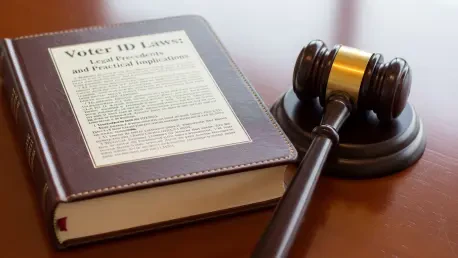In a packed courtroom in California, a fierce debate over voter rights and local autonomy unfolded as Huntington Beach defended its controversial voter ID law against state challenges, capturing statewide attention. This legal showdown, held on October 22, raised a critical question: can a city override state election rules to demand identification at the polls, and what implications might this have for reshaping how elections are conducted across charter cities? With the hearing underscoring a deep divide over balancing security with access in the democratic process, this event marks a pivotal moment in an ongoing battle that has ignited passionate arguments on both sides, drawing scrutiny from legal experts, policymakers, and community advocates alike.
Legal Battle Unfolds Over Municipal Autonomy
The appeals court hearing centered on Huntington Beach’s voter ID ordinance, a measure approved by local voters last year, which mandates identification for municipal elections—a requirement not aligned with California state law. City officials argued vehemently that, as a charter city, they hold constitutional authority to govern their own electoral processes. Their legal counsel emphasized that local control allows for tailored measures to bolster election integrity, positioning the ordinance as a necessary safeguard against potential fraud. The city’s stance resonated with a segment of the audience, reflecting a broader push for stricter voting protocols in some communities.
On the other side, the state of California countered with a firm assertion that voting regulations are a matter of statewide concern, transcending municipal boundaries. Attorneys for the state stressed that allowing cities to set divergent rules risks fracturing a uniform electoral system, potentially undermining fairness. This clash of legal interpretations dominated the session, with judges probing both sides on the limits of charter city powers under the California Constitution, leaving attendees and observers eager for a ruling that could set a significant precedent.
Logistical Concerns Take Center Stage
Beyond the legal arguments, the hearing shed light on practical hurdles tied to implementing the voter ID law. State representatives highlighted the complexity of managing separate voting systems for municipal and statewide elections, warning of voter confusion and administrative burdens. They painted a picture of polling places bogged down by dual requirements, where some voters might need ID for city races but not for state ones, potentially leading to errors or delays. This logistical nightmare, they argued, could erode trust in the electoral process rather than enhance it.
Huntington Beach’s legal team, however, pushed back, asserting that it was too early to dismiss the ordinance based on hypothetical challenges. They maintained that implementation plans remain under development and urged the court to focus on the principle of local authority rather than untested scenarios. The judges appeared attentive to these concerns, questioning how such a system would function without disrupting voter participation, signaling that practicality could weigh heavily in their final decision.
Community Voices and Accessibility Fears
The hearing also amplified concerns about how the voter ID requirement might impact Huntington Beach residents, particularly marginalized groups. Advocacy organizations present in the courtroom voiced worries that such a mandate could disproportionately affect low-income individuals, seniors, and minorities who may lack acceptable forms of identification. Testimonies submitted to the court painted a stark image of potential disenfranchisement, with some arguing that the law might deter eligible voters from participating in local democracy.
Public reaction outside the courtroom was equally charged, with a small group of protesters displaying signs advocating for voter access over restrictive measures. Local residents in attendance expressed mixed feelings, with some supporting the ID requirement as a means of ensuring fair elections, while others feared it could alienate segments of the community. This divide within the public sphere underscored the broader stakes of the case, as the outcome could influence not just policy but also civic engagement in the city.
National Implications Echo in the Courtroom
The Huntington Beach case did not unfold in isolation; it reverberated with national debates over voter ID policies that have polarized the country. References during the hearing to federal actions, such as an executive order on election integrity aimed at tightening citizenship verification, highlighted how local disputes connect to broader trends. Attorneys on both sides acknowledged that states across the U.S. vary widely in their approaches, from stringent ID laws to minimal barriers, framing this hearing as a microcosm of a larger struggle over electoral standards.
Judges also took note of ongoing federal efforts to access voter data, a move met with resistance in some regions, including parts of California. This national context added weight to the proceedings, as the decision in this case could ripple beyond state lines, influencing how other municipalities navigate the tension between fraud prevention and voter suppression. Observers left the hearing with a clear sense that the stakes extend far beyond one city’s ordinance, touching on fundamental questions of democratic access and security.
Reflecting on a Divisive Day in Court
The appeals court hearing on Huntington Beach’s voter ID law concluded without a verdict, but it left an indelible mark on all who witnessed the proceedings. The intense exchanges between legal teams, coupled with the palpable concern from community members, painted a vivid picture of a democracy at a crossroads. As the court adjourned, the unresolved question of whether local autonomy can trump state oversight lingered in the air, with a decision anticipated within the next 90 days.
Moving forward, stakeholders must prepare for the potential fallout of this ruling, whether it upholds or strikes down the ordinance. Policymakers in other charter cities should closely monitor the outcome, as it may redefine the boundaries of municipal power in election matters. Meanwhile, community leaders and advocacy groups are urged to ramp up efforts to educate voters on their rights and any forthcoming changes, ensuring that access remains a priority. Ultimately, this case serves as a call to action for broader dialogue on crafting election policies that safeguard integrity without sacrificing inclusivity, a challenge that will demand collaboration across all levels of governance.









